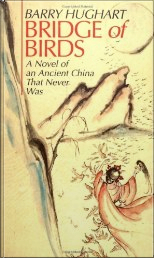

Everybody knows a little something about Ancient China. Those that confess they don't lack an appreciation for a culture steeped in arts and sciences and religions and superstitions and storytelling that has never been recounted in such an endearingly and warm manner as Bridge Of Birds by Barry Hughart.
Set in an Ancient China that never was this novel details how a silkworm harvest ends up being corrupted by a duo of unscrupulous ne'er-do-wells who end up poisoning the children of a small, though historically important, village with their avarice. A man with a pure heart and incredibly strong physical disposition named Number Ten Ox is sent with money to find a wise man who may help find a cure for the children. He does so. Returning to the village with the wonderfully aged Li Kao, a wise man with a flaw in his character, the prognosis for the children is grim. The comatose children's hope lie in the procurement of that most mystical and mythical of plant - ginseng, although the ginseng in question is so rare and difficult to procure that almost all hope for their salvation is over before it begins.
Number Ten Ox is driven to do all he can for the children. With Li Kao on his back he travels throughout China in search for this root. And what a journey is proves to be. Both of the novel's characters are the most perfect of match of brawn and brains. Together they bamboozle and inveigle all strata of Ancient China in their quest. Though both men are noble, sometimes they have to do things they would rather not. This novel will not tax your mind as there are only absolutes of good and evil to be encountered and dispatched by said duo in this short tale.
The characters that are created in this novel are comedic tragedies of pomp and privilege. I found myself laughing out loud at the descriptions of men and women such as the corpulent Ancestress with her monomaniacal bloodlust and adherence to rules she instated (she is definitely a caricature of a well known character from a classic children's novel) to her daughter named Fainting Maid, a woman who cannot be wrong, to the emasculated Henpecked Ho, all so terribly wry and well fleshed out. There is a darkness to the humour in this novel, but it only arrives in the form of the truly wicked getting what they deserve, and how it is so richly deserved. Other characters in the novel are introduced and then heard from no more serve as a Petri dish to the genius of Hughart's comedic skills. Triad leaders given such ribald names as Cut-Off-Their-Balls-Wang doesn't degenerate this novel into a simplistic toilet humour miasma of ill fitting bastards and bitches with accurate names which sum up their lack of class with a counterpoint to the depths of their depravity. The humour and comedy is never anything but classy. Sometimes slyly delivered, it never wavers in its quality. A scene where Number Ten Ox is beginning to drown in grief is carefully placated by the avuncular tones of Li Kao telling him, "Don't be ashamed of reliving your childhood, Ox, because all of us must do it now and then in order to maintain our sanity." This is them followed by Li Kao divulging the circumstances of the night of his birth, "It was a dark and stormy night," he said … There is no need to point out how he changes gear from tenderness to comedy.
This novel could have been so easily be renamed as, "The Adventures of Number Ten Ox and Li Kao," as the narrative, though delivered by Number Ten Ox, is a straight forward retelling of the two men and what they experience. It didn't bother me, but some may find it lacks variety. The further one travels with this pair, and share the situations they find themselves in, the harder it is to believe that they don't have some kind of divine intervention shielding them. So often they avoid certain death, and so often they shrug it off. The feel good factor in this book is immense, but there are characters whose back story is tinged with a pathos which gives the final outcome of Bridge Of Birds a more poignant and rounded feel. Damn, I'm sad I've finished this novel. I may even kowtow three times to the author if I ever meet him. Don't go to your grave not having read this book; the Yama Kings may not look upon it kindly.

| Authors | Awards | Blogs |
| Fanzines | Index | Magazines |
| Publishers | Retailers | Reviews |
![]()